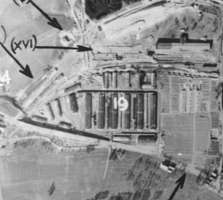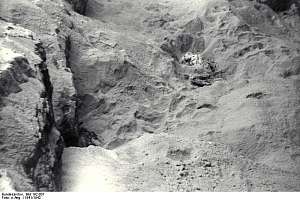KZ Gusen II (St. Georgen/Gusen)
Establishment

KZ Gusen II was founded officially on 9 March 1944 to provide prisoner labor for construction of the B8 BERGKRISTALL-ESCHE 2 Underground Plant in nearby St. Georgen an der Gusen. Some 16,000 prisoners were housed in just nineteen barracks near KZ Gusen I and were transferred by a special railway-line to the St. Georgen construction site for each working shift.
Background to BERGKRISTALL
When Allied strategic bombing reached central parts of the Third Reich in the summer of 1943, the Messerschmitt aircraft plant at Regensburg, Germany, was also hit.
A new strategy to secure war-production for the Third Reich was implemented by dispersing production and safeguarding crucial production-processes in large underground plants.
For this purpose, RFSS Heinrich Himmler and Reichsmarschall Herman Goering started to exploit the work-force of deportees from all the Nazi occupied territories.
Joint Venture
At Mauthausen-Gusen, DEST (the SS firm responsible for the exploitation of the prisoners in the stone-quarries since 1938), the German Air-Force (Luftwaffe), and Messerschmitt GmbH Regensburg started the joint venture of B8 BERGKRISTALL-ESCHE 2 for the final assembly stage of the Me 262 jet-plane within the Mauthausen-Gusen complex.
One-third of Messerschmitt production done with DEST
Due to their strategic importance, the KZ Gusen II BERGKRISTALL underground installations dominated most of the Mauthausen and Gusen camps in the final phase of the war. Even some baracks in the Wienergraben Stone-Quarry (just below the Mauthausen Central Camp) were adapted for the production of aircraft parts.
So, Messerschmitt GmbH Regensburg (together with DEST) produced nearly one third of its over-all aircraft production at KZ Mauthausen-Gusen and KZ Flossenbuerg.
Companies all over the Third Reich and concentration camps like Flossenbuerg produced in a huge logistics network parts for this jet plane whose fuselage and wings were completely assembled at KZ Gusen II (St. Georgen/Gusen) by this joint venture of Luftwaffe, Messerschmitt GmbH Regensburg, and DEST.
DEST (the SS-company) supplied:
- The tunnel system (that was built with prisoners of KZ Gusen II)
Luftwaffe (German Air Force) supplied:
- The guards for KZ Gusen II (B8 Bergkristall-Esche 2) because the SS lacked the necessary personnel already in that final phase of the war
Messerschmitt GmbH Regensburg supplied:
- The technical know-how, the materials, engineers, and skilled workers
Himmler and Goering started large deportation programs just to get the slave labor for such giant projects like BERGKRISTALL in early 1944.
Deportations from Western Europe
This meant that thousands of young people were subsequently captured in those days (especially from France, Italy, Belgium, and Luxembourg) by GeStaPo forces simply to be exhausted at underground projects like KZ Gusen II Bergkristall.
Deportations from KZ Auschwitz
Also special selections were made at KZ Auschwitz (camp Mexico) to bring thousands of young Jewish men (without any registration) directly to KZ Gusen II for excavating tunnels or to manufacture the jet planes. So, nearly one third of all registered victims of KZ Gusen II (Bergkristall) were Jewish.
The Jews belonged to the lowest group in the KZ Gusen hierarchy. They had to do the worst jobs and often survived just for a few working-days in that “Hell of Hells” at KZ Gusen II.
Extermination by Labor

For other groups of prisoners, the average survival-period reached up to four months. Marcel Callo, who died after working for a few months at KZ Gusen II, is an example.
After this period thousands were transferred to the “Sanitaetslager” at nearby Camp Mauthausen were most of them died or simply were sent for gazation to Hartheim Castle some forty km west of Mauthausen and Gusen.
The short survival-period at KZ Gusen II was due to the hard work at the tunnels and to the fact that there was little infra-structure for the 16,000 inmates of that makeshift camp.
No Infra-Structure
In many cases, the inmates lacked housing, food and clothing, as well as drinking water in KZ Gusen II. The only water was pumped in from the nearby River Danube and it was suicidal to drink it.
Freezing to Death
In winter 1944/45 so many transports came to KZ Gusen II via its direct railway-connections, that the SS decided to exterminate the transportees, who were possibly from KZ Auschwitz, by keeping them inside the railway-cars at below zero temperatures. In a matter of a days all of them were frozen to death on the rails between St. Georgen and KZ Gusen II station.
“Final-Solution” at KZ Gusen II
Dobosziewicz also writes in his book about Mauthausen-Gusen that in February 1945, Himmler and Pohl planned to blow-up the KZ Gusen tunnels with all the inmates of the KZ Gusen I & II (some 25,000 peple at that time) along with the local population of St. Georgen and Gusen, to kill any potential witnesses at later trials.
Hearing this, Mr. Louis Haefliger (Delegate of the International Comittee of the Red Cross) risked his life on May 5, 1945 to bring in US troops to prevent this final catastrophe at KZ Gusen. It was the same Squadron (the 41st Recon Squad, 11th Ard Div, 3rd US Army) that also liberated KZ Gusen I, KZ Gusen III and KZ Mauthausen on the same day.
After the Liberation
Important machinery parts of Bergkristall were removed by the US Forces until the end of July 1945. Then the Soviets took over and dismantled all the other machinery of Bergkristall-Esche 2. Finally they blew up the tunnels in November 1947 because of their strategic importance.
Recommended Literature
- Aldebert Bernard, Chemin de Croix en 50 Stations de Compiegne a Gusen II en passant par Buchenwald, Mauthausen e Gusen I, Fontenay-aux-Roses 1946 (see also Hoelzl, Gusen II …)
- Aldebert Bernard, Il campo di sterminio di Gusen II dall orrore della morte al dolore del ricordo, Selene Edizioni, Milano 2002
- Amicale Luxembourgois de Mauthausen, Letzeburger zu Mauthausen – Gusen II, Luxembourg 1970
- Bernadac Christian, Le Neuvieme Cercle – Gusen II, Editions France Empire, Paris 1975
- Dobosiewicz Stanislaw, Vernichtungslager Gusen [Extermination camp Gusen], Mauthausen-Studien, Band 5, Schriftenreihe der KZ-Gedenkstaette Mauthausen, Vienna 2007
- Fisher Joseph, The Heavens were Walled-In, New Academic Press, Vienna 2017
- Hanausch Reinhard, Luebbers Bernhard, Smolorz Roman, Spoerer Mark (ed.), Ueberleben durch Kunst – Zwangsarbeit im Konzentrationslager Gusen für das Messerschmittwerk Regensburg, Dr. Peter Morsbach Verlag, Regensburg 2012
- Haunschmied Rudolf A., NS-Geschichte 1938 bis 1945, 400 Jahre Markt St. Georgen an der Gusen, Marktgemeinde St.Georgen a.d. Gusen, 2011
- Haunschmied Rudolf A., Mills Jan-Ruth, Witzany-Durda Siegi, St. Georgen-Gusen-Mauthausen – Concentration Camp Mauthausen Reconsidered, Books on Demand, Norderstedt 2008
- Harfenes Rav Yechezkel, Slingshot of Hell, Targum Press Inc, Southfield, Michigan 1988
- Hoelzl Elisabeth, Gusen II – Leidensweg in 50 Stationen. Translated and edited after Bernard Aldebert “GUSEN 2 – chemin de croix en 50 stations” with a preface by Mr. Pierre Serge Choumoff, Bibliothek der Provinz, Weitra 1997 (see also Aldebert, Chemin de Croix …)
- Littner Karl, ed. Rudolf A. Haunschmied, Life Hanging on a Spider Web – From Auschwitz-Zasole to Gusen II, Books on Demand, Norderstedt 2011
- Littner Karl, ed. Stefan Derk, Rudolf A. Haunschmied, Ein Leben am seidenen Faden - Von Auschwitz-Zasole nach Gusen II und mein Weg zurück in die Freiheit, Books on Demand, Norderstedt 2020
- Mura Giuseppe (ed.), L´animo degli offesi – storia di Modesto Melis da Carbonia a Mauthausen (Gusen II) e ritorno, Giampaolo Cirronis Editore, Iglesias 2013 (ISBN 978-88-97397-11-3)
- Vitry Stephanie, Les Morts de Gusen, Maitrise d´histoire, Universite de Paris I, Panteon-Sorbonne, 1994
- Zuckermann Abraham, A Voice in the Chorus: Life as a Teenager Saved by Schindler, First Longmeadow Press Edition, Stamford, CT 06904, U.S.A., 1994 (like several others of the Jews saved by Oskar Schindler, Abraham Zuckerman (founding member of the USHMM at Washington) finally was sent to KZ Gusen II where he was liberated at May 5, 1945).
#RememberGusen